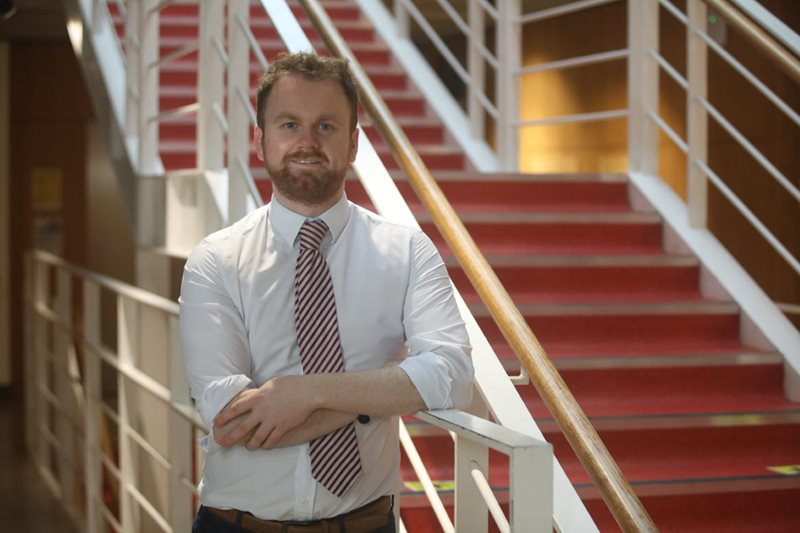
Dr James Curneen, University College Hospital Galway, Ireland.
I am delighted and privileged to have been the first recipient of the International Oral Communication Prize at the British Pharmacological Society’s annual meeting in 2021.
I am a Specialist Registrar in Clinical Pharmacology and Therapeutics, working in University College Hospital Galway, in the West of Ireland. The hospital provides tertiary care to a large catchment area and is located in a wonderful part of the country, along the wild Atlantic coast.
My oral presentation was on the topic of adherence to anti-hypertensive medications based on the research that I carried out in a tertiary referral hypertension clinic in Galway. Many challenges exist in assessing the degree to which patients adhere to taking anti-hypertensives, with adherence to these therapies challenged by multiple factors, including drug intolerances and side-effects, drug cost, treatment complexity and suboptimal physician-patient communication.
Patients were referred with apparent treatment-resistant hypertension or requiring investigation of a suspected secondary cause. As part of my research, participating patients completed a self-reported assessment of anti-hypertensive adherence and provided a spot urine sample. The presence of anti-hypertensive medications and/or their respective metabolites were evaluated using high performance liquid chromatography tandem mass spectrometry (LC-MS/MS). Patients were determined to be adherent if they demonstrated both self-reported adherence and objective mass spectrometry evidence. Through this research I discovered that only a minority of patients attending the clinic were taking all their anti-hypertensive medications, despite over three-quarters of patients self-reporting their adherence to therapies. Patients showed greatest adherence in taking their angiotensin II receptor blocker (ARBs) drugs, with calcium-channel blockers and mineralocorticoid antagonists demonstrating least adherence among patients.
This was the first time that researchers compared self-reported patient adherence to anti-hypertensives with objective evidence, with the use of the patients' urine. This technique has the potential to change accepted clinical practice in relation to the assessment and the management of medication adherence of patients, with both modalities of adherence assessment identifying the greatest number of patients who are non-adherent compared to the use of either modality alone. The use of mass spectrometry as part of routine practice in these settings could be envisioned in the future.
I applied to present our findings at the British Pharmacological Society's annual meeting, given its excellent track record in platforming pharmacology research, especially in medication adherence. My research was accepted for oral presentation, which was presented by way of a pre-recorded presentation that was streamed and then followed by real time questions and answers and a live chat function with the audience. This format was different to that which I had experienced previously, but worked very well, giving me more time to engage with the audience, leading to more constructive feedback, including advice on my study methodology and presentation of results – something that I then incorporated into future steps of my research.
I was thrilled to present for the first time at the British Pharmacological Socety and to win the International Oral Communication Prize and the Clinical Oral Prize. Furthermore, I was delighted to subsequently be invited to submit my manuscript outlining my research involving hypertension and medication adherence to the British Journal of Clinical Pharmacology.
I have a real passion for hypertension and cardiovascular disease prevention, with my research focussed on their therapeutic strategies, both at a single-centre and national level. I am privileged to have received excellent mentorship from Professor Conall Dennedy, Professor John William McEvoy and Dr David Lappin, each specialising in fields linked to hypertension - Endocrinology, Cardiology and Nephrology. My current research topics involve primary aldosteronism, as well as a cost-effective analysis of the clinical pathway in a hypertension clinic. I hope to build on the research I have already published and become more involved in national and international research in this area, with a plan for a PhD in the future. Ultimately, my goal is to become a clinician-scientist, with my clinical work in hypertension helping me to develop important research questions and to translate the research into clinical practice. I aim to gain more experience with using laboratory techniques such as mass spectrometry as a bridge between bench and bedside.
When I’m not obsessing over blood pressure measurements, I spend my free time trying to convince my boyfriend Matej that the countryside in Ireland is more picturesque than that of Slovenia. It’s a losing battle. I love to hike the wilds of Connemara and take the odd dip in the cold waters of the Atlantic. There’s a great, relaxed quality of life here in Galway, - which is also something I would recommend to avoid hypertension!
Comments
If you are a British Pharmacological Society member, please
sign in to post comments.